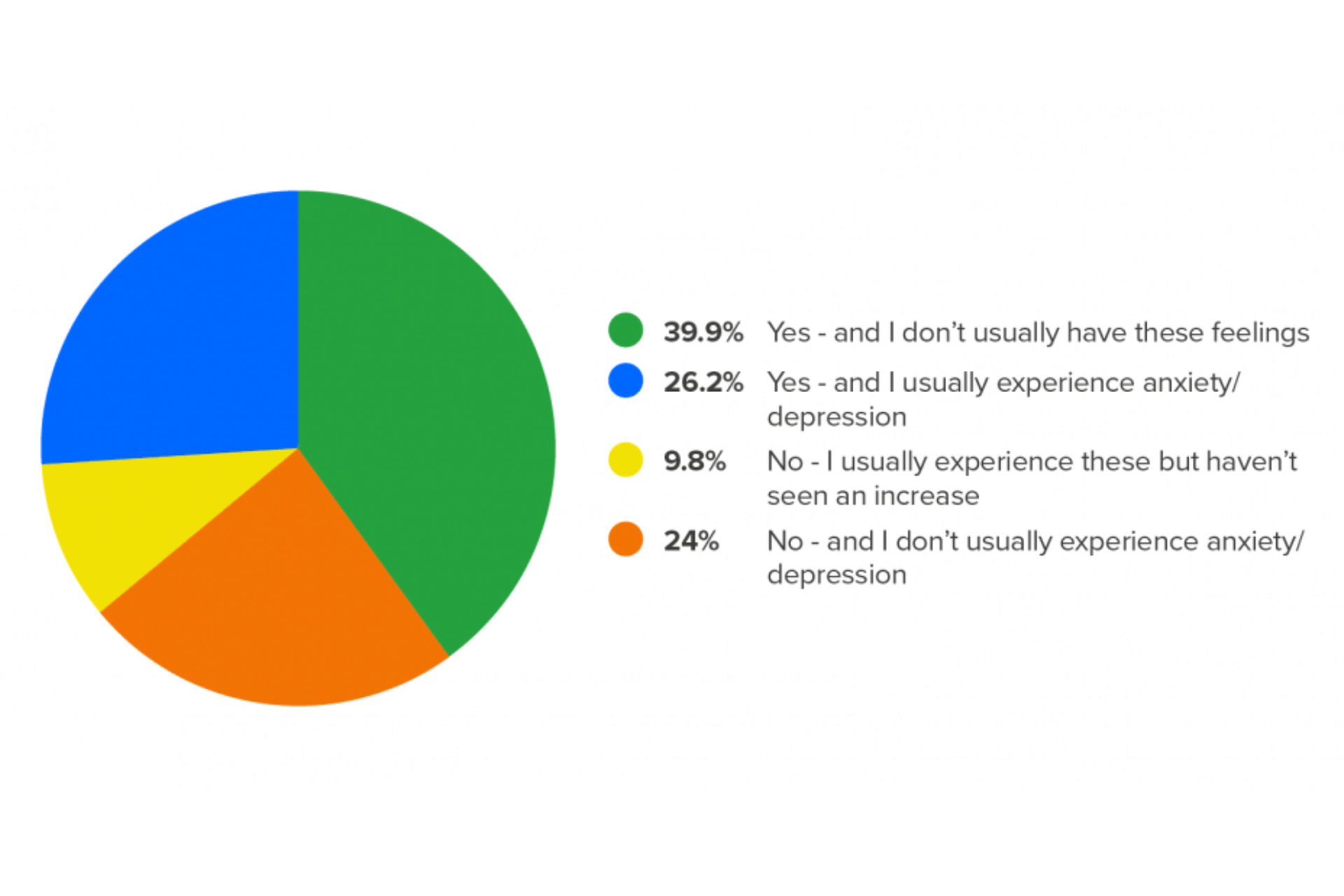Back in June we ran a webinar on mental health. It attracted a surprising number of attendees and a lot of positive feedback. Although it’s not a topic many people feel comfortable talking about openly, mental health is clearly on our minds.
How are you feeling?
We didn’t make the decision to ask people about their mental health and illness lightly. However, not speaking about mental health only keeps it, and the people suffering, in the dark. Hearing that others feel the way you do, can also be a small comfort – knowing you’re not alone. The more mental health is talked about, the more people can understand their own feelings and those of others.
“1 in 6 adults experiences a common mental health problem, such as anxiety or depression. 1 in 5 adults has considered taking their own life at some point.”
– Mental Health Foundation (2016)
183 accountants and bookkeepers chose to take part in our survey, all anonymously. As the results show, mental health is a very real problem in the accountancy industry and that deserves all of our attention.
93.5% of respondents have experienced higher than normal levels of stress this year
Have you experienced higher than normal levels of stress this year?
We all know accountants and bookkeepers have been under a lot of pressure this year, so the first two graphs won’t come as a surprise. That doesn’t make them any easier to see. A total of 93.5% of respondents have experienced higher than normal levels of stress this year, with 63.4% reporting a significant amount higher.
“This has been a well and truly dreadful year! Stress, stress, stress!!”
“Extra work load, work piling up, working six days per week, no time with family. I could go on and on…..”
Have your stress levels caused you serious concern? We can all cope with a bit of stress and many people thrive off it. But there can come a time when it overwhelms you and starts impacting your life in negative ways. We attended a great talk at Accountex on burnout. Unchecked, constant stress or ‘running on nervous energy’ will often lead to burnout. Over half of respondents have been concerned about their levels of stress.
We can all cope with a bit of stress and many people thrive off it. But there can come a time when it overwhelms you and starts impacting your life in negative ways. We attended a great talk at Accountex on burnout. Unchecked, constant stress or ‘running on nervous energy’ will often lead to burnout. Over half of respondents have been concerned about their levels of stress.
Almost 40% of people have experienced anxiety and/or depression for the first time ever, this year
As well as burnout, the psychological effects of ongoing high levels of stress match those of the most common mental disorder in Britain – anxiety and depression. According to The Mental Health Foundation’s 2018 YouGov survey, 51% of adults who felt stressed reported feeling depressed, and 61% reported feeling anxious. That doesn’t mean stress will necessarily lead to a diagnosable disorder, (7.8% of people meet the diagnosable criteria for ‘mixed anxiety and depression’ – NICE), but it shows that stress is a significant factor in developing more serious problems.
“To be honest I have a constant battle with [mental health] anyway so [the pandemic] has been just an additional part to add to the puzzle.”
Anxiety and depression are not simply worrying all the time or feeling sad. It’s like seeing the world through a completely different lens, affecting how you think, respond and behave – making it hard to enjoy the things you like or even function at all.
Have you experienced increased anxiety or depression this year?
Do you identify as having a mental health illness, whether diagnosed or not?
Alarmingly, 66.1% have experienced an increase in anxiety or depression this year – whether or not they’ve experienced them in the past. Add to that the people that usually experience these feelings but haven’t seen an increase this year and you get 76% of people struggling with their mental health. Compare that to only 25.8% of people that already identify as having a mental illness and you can see why psychologists are warning of a psychological pandemic to follow the virus.
“It has increased stress and anxiety a lot.”
“Feel very down.”
Perhaps the most startling statistic is that almost 40% of people have experienced anxiety and/or depression for the first time ever, this year. This shows how big an impact the pandemic has had.
On a lighter note, a third (33.8%) of people haven’t experienced an increase in anxiety and depression this year, whether they usually have these thoughts and feelings or not. And just under a quarter of people (24%) don’t experience them at all.
“In some ways the lockdown in April was beneficial to my mental health. For the first time ever I had a complete break from social engagements.”
Of course there are also those whose mental health has actually improved. Included in this group are those whose energy is drained by working in an office and socialising, like these respondents: “2020 has been a mixed bag. In some ways the lockdown in April was beneficial to my mental health. For the first time ever I had a complete break from social engagements, which was a relief. As a home-based sole practitioner, my work life continued almost as normal… The continuing uncertainty, media-exacerbated doom and gloom are getting to everyone now, I think.”
“I’m a very easy-going person, and definitely more comfortable indoors than outdoors. Right now as I type this I’m sat at my kitchen table in my dressing gown. My productivity has taken a slight hit, but my comfort levels are at an all-time high.”
69.9% have felt unable to cope – either a little or a lot
Have you felt unable to cope?
Have you spoken to a professional about your mental health since March or are you planning to? 
Even though almost 40% of people have experienced increased feelings of anxiety and/or depression and 69.9% have felt unable to cope (either a little or a lot), only 20.3% have seeked or are planning to seek professional help. The reasons for this will no doubt be plentiful. Fear of being put on drugs, not wanting to speak to a stranger, no time, or simply hope that – to quote a popular tattoo… and Abraham Lincoln – “this too, will pass”. One respondent stated another reason behind their mental state and not accessing support: “HMRC and no support for accountants.”
1 in 5 people say the pandemic has affected their mental health ‘very negatively’
In summary, we asked participants to rate, on a scale of 1 – 5, how much the pandemic had affected their mental health. From 1: very positively, through 3: no change, to 5: very negatively.
How much has your mental health been affected by the pandemic?

61.7% of people have felt that the pandemic has negatively affected their mental health – 21.1% of those, very negatively. At the other end of the spectrum, 8.4% of people have experienced a positive change to their mental health. While there’s a lot of focus on the negative effects, it’s important to acknowledge that a proportion of that 8.4% of people actually struggle more when things are ‘normal’. It’s important not to feel guilt in this category, but to look at what has changed and why it feels better.
Feeling a bit despondent? Let’s end with this gem from one insightful participant…
“2020 can get in the bin”
A huge thank you
If you took part in our survey, thank you for being so open, honest and frank. It wasn’t easy reading some of your responses, there are a lot of you really going through it right now. Please be kind to yourself and if you are struggling to cope, do reach out to someone. Sometimes the hardest thing to do is what will help you the most.

